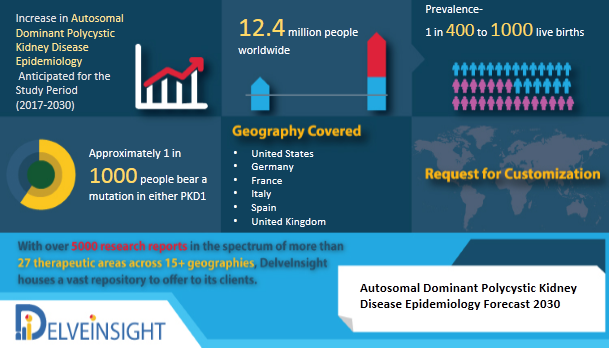“Autosomal Dominant Polycystic Kidney Disease Epidemiology” report has been added to DelveInsight
Autosomal Dominant Polycystic Kidney Disease Overview
Autosomal Dominant Polycystic Kidney Disease (ADPKD) is a genetic disorder which causes pathological cystic changes to the kidney and is characterized by numerous renal and systemic manifestations. Renal manifestations are produced by the progressive and continuous enlargement and proliferation of fluid-filled cysts, leading to enlargement of the kidney up to five times the normal volume in the years prior to the development of kidney failure.
ADPKD may lead to development of end-stage renal disease (ESRD) and is the fourth most common renal disease requiring renal replacement therapy (RRT). The most common extra-renal manifestation is polycystic liver disease (PLD), which is more common in women than in men.
Autosomal Dominant Polycystic Kidney Disease Epidemiology Forecast
Autosomal Dominant Polycystic Kidney Disease epidemiology Historical as well as forecasted epidemiology in the United States, EU5, Japan and China from 2017 to 2030
Request for free sample copy- https://www.delveinsight.com/sample-request/autosomal-dominant-polycystic-kidney-disease-epidemiology-forecast
Autosomal Dominant Polycystic Kidney Disease Epidemiology Report
Genetic mutation plays a major role in the pathogenesis of ADPKD, mainly mutations in the PKD1, PKD2 genes leads to cyst formation and its progressive growth. ADPKD is often called as “adult PKD” as it mostly presents between 30 and 50 years old.
Key facts of the ADPKD epidemiology report
- Mutations in either the PKD1 or PKD2 gene can cause ADPKD, PKD1 and PKD2 encode polycystin 1 and polycystin 2 and approximately 1 in 1000 people bear a mutation in either PKD1 or PKD2 genes worldwide.
- ADPKD affects more than 600,000 Americans and 12.4 million people worldwide. About nine out of every 10 people with PKD have the autosomal dominant form. The prevalence of ADPKD is estimated to range from 1 in 400 to 1000 live births, with 5,000–6,000 new cases diagnosed each year (Rashid, 2018).
- According to epidemiological review of ADPKD in the EU, a minimum prevalence of 2.41 and 3.89 per 10,000, and screening prevalence of 3.3 and 4.6 per 10,000 of ADPKD has been found in the German and British population-based studies. Whereas in registry-derived method, the minimum prevalence was 3.29 per 10,000, and if ADPKD screening was implemented in all European countries, the expected prevalence was 3.96 per 10 000 (Willey, 2017).
- According to Hospital-based nationwide survey in Japan, it has been found that the prevalence of ADPKD increased with age and reached a peak value of 261 per million population at the age group of 55-59 years. The probability of end-stage renal disease is at most 50% among ADPKD patients
Autosomal Dominant Polycystic Kidney Disease Epidemiology Segmentation
- Total Prevalent cases of Autosomal Dominant Polycystic Kidney Disease (ADPKD) in the 7MM and China (2017-2030)
- Age-specific cases of Autosomal Dominant Polycystic Kidney Disease (ADPKD) (2017- 2030)
- Diagnosed and Treatable cases of Autosomal Dominant Polycystic Kidney Disease (ADPKD) (2017- 2030)
Autosomal Dominant Polycystic Kidney Disease Treatment
There is no cure for ADPKD and it not possible to stop cysts forming in the kidneys, however, a lot of research has been done in this space to find the ways to manage the disease. Majority of patients with ADPKD will eventually develop ESRD and require RRT. The progressiveness of this disease and its complications cause debilitating effects on health of patients and impose a significant burden, both economically and on the quality of life.
Autosomal Dominant Polycystic Kidney Disease Report Scope
- The Autosomal Dominant Polycystic Kidney Disease report covers a detailed overview explaining its causes, symptoms, and classification, pathophysiology, diagnosis and treatment patterns
- The Autosomal Dominant Polycystic Kidney Disease Epidemiology Report and Model provide an overview of the risk factors and global trends of Autosomal Dominant Polycystic Kidney Disease in the seven major markets (7MM:US, France, Germany, Italy, Spain, UK, and Japan)
- The report provides insight about the historical and forecasted patient pool of Autosomal Dominant Polycystic Kidney Disease in seven major markets covering the United States, EU5 (Germany, Spain, France, Italy, UK), and Japan
- The report helps to recognize the growth opportunities in the 7MM with respect to the patient population
- The report assesses the disease risk and burden and highlights the unmet needs of Autosomal Dominant Polycystic Kidney Disease
- The report provides the segmentation of the Autosomal Dominant Polycystic Kidney Disease epidemiology
Request for free sample copy- https://www.delveinsight.com/sample-request/autosomal-dominant-polycystic-kidney-disease-epidemiology-forecast
Table of content
- Key Insights
- Executive Summary of Autosomal Dominant Polycystic Kidney Disease
- Autosomal Dominant Polycystic Kidney Disease: Disease Background and Overview
- Patient Journey
- Epidemiology and Patient Population
- Treatment Algorithm, Current Treatment, and Medical Practices
- KOL Views
- Unmet Needs
- Appendix
- DelveInsight Capabilities
- Disclaimer
- About DelveInsight
Reasons to buy
- The Autosomal Dominant Polycystic Kidney Disease Epidemiology report will allow the user to –
- Develop business strategies by understanding the trends shaping and driving the global Autosomal Dominant Polycystic Kidney Disease market
- Quantify patient populations in the global Autosomal Dominant Polycystic Kidney Disease market to improve product design, pricing, and launch plans
- Organize sales and marketing efforts by identifying the age groups and sex that present the best opportunities for Autosomal Dominant Polycystic Kidney Disease therapeutics in each of the markets covered
- Understand the magnitude of Autosomal Dominant Polycystic Kidney Disease population by its epidemiology
- The Autosomal Dominant Polycystic Kidney Disease Epidemiology Model developed by DelveInsight is easy to navigate, interactive with dashboards, and epidemiology based with transparent and consistent methodologies. Moreover, the model supports data presented in the report and showcases disease trends over 11-year forecast period using reputable sources
Media Contact
Company Name: DelveInsight Business Research LLP
Contact Person: Yash Bhardwaj
Email: Send Email
Phone: +919650213330
Address:304 S. Jones Blvd #2432
City: Las Vegas
State: NV
Country: United States
Website: https://www.delveinsight.com/

